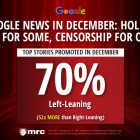A group with financial ties to Google is trying to convince the United States Supreme Court to strengthen the company’s liability protections—and censorship powers—under Section 230 of the 1996 Communications Decency Act.
Politico reported Friday that “prominent internet influencers and the nonprofit Authors Alliance filed an amicus brief” in support of Google in Gonzalez v. Google. The groups responsible for the brief have financial ties to leftist Google, according to Politico:
[T]he parties behind [the brief] had direct financial ties to Google. The group that funded the brief, a nonprofit advocate for startups called Engine, is funded in part by Google. And at least one of the content creators who signed on to the amicus brief has said that employees from YouTube, a Google subsidiary, invited them to sign onto the brief. In addition, the firm representing the creators and Authors Alliance — Keker, Van Nest & Peters — represents Google in other litigation.
While Google did not respond to the online publication’s multiple requests for comment, Ben Berkowitz, an attorney for Authors Alliance, insisted that none of the signatories were paid by Google to sign the brief, according to the report. Berkowitz also claimed that Google and its affiliates in no way contributed funding to the brief.
“‘Our firm’s representation of Google in unrelated litigation is public knowledge, and not a conflict,’” he said, according to Politico. “‘We represented Authors Alliance and a diverse group of individual content creators to express their views to the Supreme Court about the important role Section 230 plays in protecting and promoting diverse and independent content.’”
The Court’s ruling in Gonzalez could impact Google’s unchecked censorship in the future.
Last week, MRC Free Speech America reported that Google censored a Townhall.com column by Senator Rand Paul (R-KY). Paul wrote of the dangers of gain-of-function research, which manipulates a virus to increase its contagiousness. Google reportedly claimed the article contained “‘unreliable and harmful claims.” However, according to Townhall.com, the Big Tech giant later removed the flag and stated it was “labeled in error.”
The company also influences politics. MRC Free Speech America exposed Google’s one-sided bias in an October 2022 study showing how the company’s search results favored Democrats in crucial senate races during the 2022 midterm elections by burying the websites of their GOP opponents. Similarly, Google was also caught de-emphasizing the campaign websites of Big Tech critics.
Conservatives are under attack. Contact your representatives and demand that Big Tech be held to account to mirror the First Amendment while providing transparency, clarity on so-called hate speech and equal footing for conservatives. If you have been censored, contact us using CensorTrack’s contact form, and help us hold Big Tech accountable.








